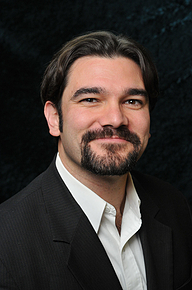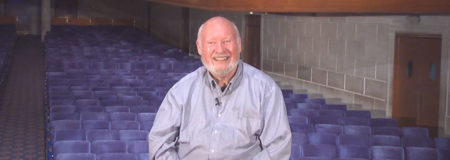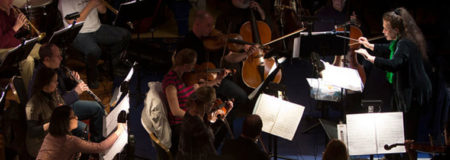by Daniel Hathaway

One of the founders of Opera Western Reserve thirteen years ago, Vosburgh has a long list of credits as a singer, director and designer for opera companies and Broadway shows. This season, he will be designing his second production of Carmen for the Youngstown company. “It’s totally different than the show we mounted nine years ago,” he said. “We have more sophisticated facilities now, including a scene shop and a wonderful scene painter. And this is the first time that I will be designing a show for another director.”

OWR’s production will feature Rhea Olivacce as Carmen, Kisma Jordan as Micaela, Matthew Vickers as Don José, Luke Scott as Escamillo, Alexa Lokensgard as Frasquita, Shafica Kaleel as Mercedes, Michael Pegher as Remendado, Giustino Carrano as Dancairo, Brian Keith Johnson as Morales, and Jason Budd as Zuniga. Susan Davenny-Wyner will conduct, Jon Simsic is chorus master, and Molly Gavin is preparing the children’s chorus.
“We do all our auditions on the Stambaugh stage, which is unusual for opera,” Vosburgh said. “Three of the principals are making their debuts with Opera Western Reserve as well as singing their roles for the first time. We try to cast locally as much as we can. Part of our mission as a company is to give singers the opportunity to learn a new role with good musical preparation, good staging, and a wonderful conductor, in a full production without being under the microscope of major media.”

Skiba was happy to work within Vosburgh’s concept, which was all ready to go when he was invited to direct the show. “My only contribution to the stage setting was to swag some fabric down on the unit set to create a more intimate feel for the Act II tavern scene,” Skiba said.
The guest director does have some interesting challenges in mind for the cast. “I told the singers that because Carmen is such an iconic opera, I want to frame the interpretation of characters differently,” he said. “Instead of playing the characters as icons, can we decide how to communicate what would happen if we really were these people? Let’s try to engage the audience in a new experience with repertoire they already know. For example, I’ve been involved with a lot of Carmens, but I’ve never heard Micaela ever use a character voice when she’s talking about her Mom.”
Skiba envisions a very physical production that projects an innate sensuality. He’s also letting his singers develop their own moves in scenes like the Seguidilla. “I give them 20 feet of rope and tell them that I have some ideas, but see what you can do with it,” he said. “I’ve seen a lot of rope choreography for that scene, but it can be a lot of fun if you play with tying, writhing and a tug-of-war. Just make sure it goes with the music and the text.” And as a singer who has played Escamillo many times, Skiba is having a good time working with Luke Scott on the expert use of his bullfighter’s cape.

One of the unique features of Opera Western Reserve is that the company performs its annual opera only once. How does it feel for a director to stage a one-off show? “It doesn’t have as big an impact on me as it does on the cast,” Skiba said. “Once I’ve gotten through the piano tech, there’s nothing much else I can do. I try to back off after that so the actors can do their thing. I think doing a single performance is a smart choice on the company’s part. They know their patron base, and one show in front of a full house creates a more magical experience in the theater.”
Published on ClevelandClassical.com November 8, 2016.
Click here for a printable copy of this article



